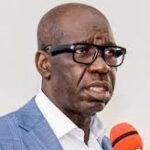It was early 2022 when the recurrent rift between state governors and their deputies made the headline again.
The then governor of Zamfara State, Bello Matawalle, now the Minister of State, Defence, was allegedly exploiting every opportunity to deal with his deputy, Mahdi Ali.
The rift started after Mahdi refused to follow Matatwalle who had defected to the All Progressives Congress (APC) from the Peoples Democratic Party (PDP).
Matatwalle and Ali came into office by chance, analysts said, on the platform of the PDP, after the Supreme Court disqualified candidates (including the governorship candidate, Mukhtar Shehu Idris) of the APC, who had been declared winners in the 2019 elections in the state.
- We’ll break barriers to deliver affordable housing – Dangiwa
- North to witness energy transition as marketers partner NNPCL, others
The Supreme Court ruled that the APC did not conduct valid primaries in the buildup to the 2019 general elections in the state. Idris’ loss then became Matatwalle’s gain.
This political intrigue ended in February 2022 with Ali being impeached by the state House of Assembly.
Ali and Matatwalle’s political vendetta is neither the first nor the last in the list of the series of political duels involving governors and their deputies in Nigeria.
There was Tinubu versus Akerele-Bucknor between 1999 and 2003; Yahaya Bello versus Simon Achuba; Rotimi Akeredolu versus Agboola Ajayi; Abdullahi Umar Ganduje versus Professor Hafiz Abubakar, among others.
However, the ongoing war for dominance between Governor Godwin Obaseki and his deputy, Philips Shuaibu has its own complexities and as the rift intensifies, each of the two warring political powerhouses in the state is struggling fiercely to have the other by the balls.
While Shuaibu accused the governor of using security operatives to intimidate him, Obaseki accused his deputy of plotting a coup against him.
The governor had openly said the “Emilokan factor” (it-is-my-turn slogan) would not work in Edo State, ruling out the possiblity of being succeded by Shuaibu.
This political intrigue has become so glaring, if not a norm, that people ask why state governors endlessly fight their deputies.
However, a political analyst, Hassan Jibia, identified a mismatched combination, Emilokan, constitutional flaw and cabal as some of the factors responsible for the rift between state governors and their deputies.
Forced political marriage
Jibia said that most of the rifts between state governors and their deputies were caused by a forced marriage legalized by political godfathers.
He said, “The rift is caused by mismatch or a forced political marriage, since the deputy is mostly nominated actors other than the would-be governor.
“These actors are political godfathers that come together to form a merger to win an election. They sit and nominate a candidate that they want to carry the ticket.
“When the election is won, the deputy is seen as a kind of a stooge or an informant to those political godfathers, who nominated him. This creates a lack of trust and makes it difficult for them to work together.
“The case of El-Rufai’s deputy, Hadiza Sabuwa Balarabe, is a clear example. The same is what happened in Zamfara State between Matawalle and Mahdi.”
Constitutional flaw
Jibia said the Nigerian constitution vested much power to the governor and rendered the deputy almost redundant.
He said, “The constitutional order we are following has given too much power to the head of the executives and almost no power to the deputy governor.
“The deputy governor can only perform functions assigned to him by the governor. The governor controls almost all the institutions in the state.
“For example, in Edo State the deputy governor, Philips Shuaib is accusing Obaseki of using security operatives to harass him. The governor is reportedly influencing the state assembly to impeach the deputy. You can see the deputy governor has no power as he is also answerable to the governor.
“In Zamfara, Matawalle asked the assembly to initiate the impeachment process against Mahdi for alleged insubordination. But in truth it was because the deputy refused to follow him to the APC.”
Cabals
The analyst argued that in some cases the chief of staff and governor’s personal assistants were more powerful than the deputy governor.
He said that any move by the deputy governor might be viewed as an attempt to solidify his stance in the party or hijack the government.
He said, “Kitchen cabinet is always working to instigate the governor against his deputy. This is the reason the deputy governor can’t object to anything the governor’s team proposes. In most cases some members of the cabinet have more access to the governor.”
Emilokan factor
Jibia stated that some of the political agreements were that the governor would be succeeded by his deputy.
“But along the way, the governor develops some interests and sees the deputy as a kind of threat. As the rift widens the governor hides things from this deputy because of lack of trust.
“Then the governor nominates one of his loyalists to succeed him. It was by luck that Kwankwaso nominated Ganduje to succeed him.
“In Edo, the governor came out to say that the Emilokun factor would not happen in the state because he sees Philips Shuaibu as a threat, who may expose some of his misdoings if given a chance,” he added.
According to Jibia, to address the issue, governors should be allowed to select the persons they want to work with.
He stated that only constitutional amendment can cure the rift and give deputy governors some sort of power, specific roles and responsibilities and restrict conditions for impeachment.
“This may include consensus from the public and party leaders,” he added.

 Join Daily Trust WhatsApp Community For Quick Access To News and Happenings Around You.
Join Daily Trust WhatsApp Community For Quick Access To News and Happenings Around You.

